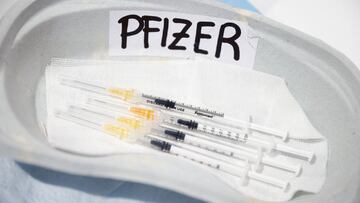What side effects does the covid-19 vaccine have on children?
Only the Pfizer covid-19 vaccine is authorized for use in those under age 18. For parents concerned about any side effects, here’s what you need to know.

Results from the clinical trials of the covid-19 vaccines that have been either authorized for emergency use in the US or approved, show that they are safe and effective. Currently, only the Pfizer covid-19 vaccine has been authorized for those under the age of 18.
The side effects experienced, if any, by young children were similar to those in people age 16 and older and were generally mild, lasting only for a few days. Infection with covid-19, however, has proven just as serious for young children as adults resulting in hospitalizations and almost 100 deaths of kids between 5 and 11 years old.
Also see:
- Omicron variant: latest news
- Deltacron variant "not a technical error" says scientist
- What is the link between diabetes and covid-19 in children?
- Children and the Omicron variant, no greater risk found
Covid-19 vaccine side effects, if any, are generally mild
All vaccines can cause some form of adverse reaction, which are generally mild unless the patient has a severe allergic reaction. Children are monitored for 15 to 30 minutes after receiving a covid-19 vaccine to see if there is an allergic reaction that requires treatment.
In the case of the Pfizer covid-19 vaccine, children under the age of 16 that experience side effects, generally have similar ones as those who are 16 and older. The most common side effects include pain where the shot was given as well as, chills, decreased appetite, fatigue, fever, headache, joint pain, muscle pain, nausea, and swollen lymph nodes.
With the exception of pain at the injection site, more kids reported experiencing side effects after the second dose. The adverse effects generally manifest within two days of receiving their jab, and typically last one to three days. But not everyone experiences side effects which are just the body’s immune system doing its job.
Although prior to vaccination it isn’t recommended to give your child over-the-counter pain reliever to stave off potential side effects, it is okay afterwards to treat any discomfort they may experience.
Heart inflammation caused by covid-19 is extremely rare and can be treated
There have been rare cases of myocarditis, an inflammation of the heart muscle, and pericarditis, an inflammation of the lining outside the heart, reported in the US in the days after receiving a covid-19 vaccine. These were particularly found to happen in the week after the second dose in males between the ages of 12 and 17.
But there have only been roughly 54 cases per million doses given in that age group. Most who experienced this adverse reaction and were treated quickly felt better after receiving care. If your child experiences any of the following symptoms; chest pain, sensation of heart beating fast, fluttering or pounding and/or shortness of breath, within a week of being vaccinated against covid-19, you should seek medical care for them.
In the clinical trials of 5- to 11-year-olds, there were no reports of myocarditis in kids that received the covid-19 vaccine.
For parents worried about the safety of the Pfizer covid-19 vaccine in their children the Mayo Clinic provides a “What you need to know” website.
New @CDCMMWR finds children and teens 18 years & younger who have had #COVID19 are up to 2.5 times more likely to have a #diabetes diagnosis after infection. Prevent COVID-19 by using tools like masks and #vaccines for those eligible. Learn more: https://t.co/8tYS9UwYt4. pic.twitter.com/EY2rSAcKz6
— CDC (@CDCgov) January 7, 2022
Vaccination is the best way to keep children and those around them safe
Of the approximately 28 million children between the ages of 5 and 11 in the US, roughly 2 million have come down with covid-19. They are just as likely as adults to get infected and can become very sick from the disease or even die. According to the CDC, covid-10 is currently one of the top ten causes of death for children between the ages of 5 and 11.
Over 8,300 kids aged 5 through 11 have been hospitalized because of covid-19 infection as of the middle of October 2021 according to the CDC. Children can have both short- and long-term health complications from covid-19.
Related stories
One such serious complication is multisystem inflammatory syndrome (MIS-C). Over 2,300 kids between the ages of 5 and 11 have reported cases of MIS-C since the start of the pandemic. MIS-C is a condition where different body parts become inflamed, including the heart, lungs, kidneys, brain, skin, eyes, or gastrointestinal organs.
A recent study by the CDC also found among the increased number of children diagnosed with both Type 1 and Type 2 diabetes since the start of the pandemic, the rate was higher for those children who had been infected with covid-19.


